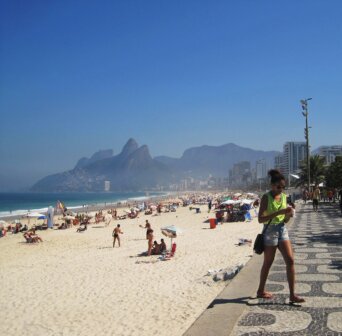- About
- Topics
- Story
- In-Depth
- Picks
- Opinion
- News
- Donate
- Signup for our newsletterOur Editors' Best Picks.Send
Read, Debate: Engage.
| topic: | Human Rights |
|---|---|
| located: | Brazil, Peru |
| editor: | Ellen Nemitz |
A photo rapidly spread on the internet: Ipanema beach, in Rio de Janeiro, crowded in a way that turns social distancing rules impracticable. In Peru, some days earlier, 13 people died after a police intervention in an illegal party. In some cities, the mandatory face mask is no longer a concern for many citizens – not to mention places where its use (or the right to go without it) is a political dispute. Meanwhile, the pandemic is still ongoing, giving little respite.
Brazil has been keeping the number of daily new deaths very close to one thousand – the 875 average from last week brought some hope of a slowing tendency, but in the end, this is just a tough reminder that we may have naturalised the mass lives loss. Peru, even while applying strict quarantine rules, achieved the sad record of the country with more deaths per capita. So, why do some people act like nothing is happening?
Psychologists have been studying our behaviour since the beginning of the outbreak in many countries and tend to say that our brains respond with fear following a threat appears – in this case, the virus – but as time goes by the 'alert system' gets weaker. Also, creating false normality can be a protection tool for a continued and deep trauma caused by the event. However, people at the beach or at parties can be just a portrait of our unequal and selfish society – poor people have to work while the elite goes partying.
Even before all this disruption of our claimed 'normality', the world was in trouble. The environment has been systematically destroyed in the name of an economic development which enriches some and exploits others, entire populations are attacked, such as various indigenous communities around the world, countries go through cruel and senseless wars. The world has improved over the centuries, with better laws and science, but is still a place where more than 300 human rights defenders were killed in 2019 – according to the Peace Brigades International, land defence, climate change, migrant rights, LGBTI+ rights and mega-projects are among the most dangerous fields to act in.
Former U.S. President Barack Obama once said: “People have a tendency to blame politicians when things don’t work, but as I always tell people, ‘You get the politicians you deserve.'” Of course, in a democracy, the elected leaders do not represent everyone, but they reflect many tendencies. For example, after a year and a half of numerous disrespects to the population and to the media; of countless evidence of corruption, and of a disastrous response to the pandemic, Brazilian president Jair Bolsonaro would win the next election if it was held today in all possible scenarios. His popularity grew on the vast poverty and lack of opportunities of the country, as its boosting factor was the extension of emergency aid, an amount paid for those affected by the economic crisis.
But maybe we should consider that the “so what?” – one of his reactions to the rising statistics of Brazilians dead due to coronavirus reflects the country’s indifference to others. "Let's go on with life," said Bolsonaro. And millions of people are doing it, despite all the risks, by necessity in some cases, or just by pleasure among those who can. The virus wins where selfishness wins.
Image by ASSY

